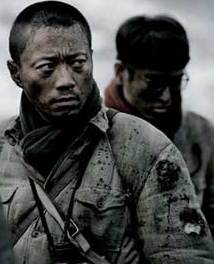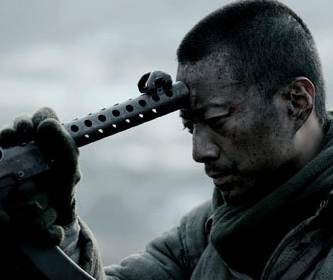 Sylvain
Richard is a film critic at Arts & Opinion. He
gave Assembly, which played at Montreal's 2008
Fantasia Film Festival, 3.4 out of 4 stars.
For the rest of his ratings, click
HERE.
Sylvain
Richard is a film critic at Arts & Opinion. He
gave Assembly, which played at Montreal's 2008
Fantasia Film Festival, 3.4 out of 4 stars.
For the rest of his ratings, click
HERE.
The
'assembly' refers to the call of the bugle to retreat and
regroup. This is the call Captain Gu Zidi (Zhang Hanyu) and
his 47 men of the 9th Company, 3rd Batallion, 139th Regiment,
are keenly listening out for as they go about their mission
in ill-equipped fashion, holding fort on a strategic plain.
 Sent
to the frontlines for war crimes, Captain Gu and his men,
while being the best at trench warfare, find themselves severely
lacking in essentials -- manpower, ammunition and heavy weaponry,
as they go up against the marauding forces of the Nationalist
army, with their superior armour. But Captain Zidi is from
the old school -- only the bugle will keep them from prosecuting
their mission objectives at all costs.
Sent
to the frontlines for war crimes, Captain Gu and his men,
while being the best at trench warfare, find themselves severely
lacking in essentials -- manpower, ammunition and heavy weaponry,
as they go up against the marauding forces of the Nationalist
army, with their superior armour. But Captain Zidi is from
the old school -- only the bugle will keep them from prosecuting
their mission objectives at all costs.
Assembly,
directed by Feng Xiaogang, honours the spirit of the unit,
its tales of bravery and unflinching courage against insurmountable
odds. If you're looking for a top-notch war movie, Assembly,
at least for the first hour, will not disappoint. Told in
three acts, the first act -- all 60 minutes of it -- is where
the action takes place. The war sequences aren't poetic in
the style of Terence Mallick's The Thin Red Line,
but have been fashioned after Steven Spielberg's Saving
Private Ryan with its gritty realism, strained colours
and bloody, gory violence.
War
movies, as a rule, put us in the shoes of aggressors, and
invite us to follow an assault team. Very rarely are we set
in trenches, on the defensive, as in the film Iwo Jima
where the viewer is made to soak up wave after wave of attack.
And that's where Assembly shines, in featuring four intense
battle sequences, three of which are defensive, while the
other, which is an assault, focuses more on the losing end
as well as the plight of the victims.
The
details of the war and its equipment are shown to great effect:
from the single bolt weapon, the primitive artillery and its
deployment to the highly affecting sharing of tin helmets.
You might find yourself wondering why the PLA was so equipmentally
challenged given the world's technological advancement in
military ordnance n the West/Japan during the 1940s.
In
the context of Clint Eastwood’s double,  Flags
of our Fathers and Letters from Iwa Jima,
Assembly combines what is best in both movies and
provides an in-depth look at the battles fought, as well as
the down time between battles where soldiers are obliged to
contemplate matters of life and death.
Flags
of our Fathers and Letters from Iwa Jima,
Assembly combines what is best in both movies and
provides an in-depth look at the battles fought, as well as
the down time between battles where soldiers are obliged to
contemplate matters of life and death.
In
the second and last acts which take up the remaining hour,
we follow Captain Gu as he attempts to get his company recognized
for the contribution it made, no matter how minuscule it might
seem compared to the helicopter view of achievements. If the
second half of the film can be accused of wanting in action,
it is rescued by one man’s relentless fight for the
recognition of his lost comrades, and as such, comprises the
perfect denouement for a film that recommends itself for the
handling of its complex material.
Assembly
is unapologetically an ambitious film, combining action and
existential drama that make for the ugly and heart wrenching
truths of all wars. Kudos go to actor Zhang Hanyu who plays
Captain Gu, who, in fighting for his place in history as well
as against the system that would rather squash the hard fought
truths of war, is a tour de force throughout the entire film.
Assembly
is yet another reason why Chinese cinema is among the
very best in the world.
For
the ratings of Montreal's 2008 Fantasia Film Festival, click
HERE.